Monkeypox outbreak UAE: First case detected in the UAE. What are the chances of it spreading through schools? What is the death rate?
Monkeypox has now arrived in the UAE, according to the Ministry of Health and Prevention (MoHAP). The emirates’ first case of the virus was detected on Tuesday 24 May in a 29-year-old woman who arrived from West Africa, MoHAP reported, now bringing this usually rare African disease closer to home for UAE families.
Although MoHAP reassured community members that the patient in question is receiving treatment, and UAE health authorities are taking all necessary measures to track and prevent spread of the illness, parents still reeling from the impact of the Covid-19 pandemic are now worried about what it could mean for their children and the possibility of it spreading in schools.
But what do we know so far about Monkeypox and how likely is it that it will cause anything like the sort of disruption as we saw with coronavirus? Here’s what you need to know…
How serious is this? What is the death rate from being infected?
The Centres for Disease Control and Prevention confirms a death rate of 1 in 10 of those contracting monkeypox in Africa. The risk factor increases in children and younger adults. The mortality in unvaccinated children in the Republic of the Congo was between 15% and 20% in children in a study of 300 patients. However, the World Health Organisation has confirmed that all cases to date are genetically part of the West African clade which cause less severe disease compared to the Congo Basin clade. The case fatality rate is 3.6% compared to 10.6% for the Congo Basin clade. The key issue facing all countries is to contain the outbreak very quickly.
How far has monkeypox spread so far?
As of 21 May, the World Health Organisation (WHO) reported that there were 92 laboratory confirmed cases of monkeypox, and 28 suspected cases of monkeypox with investigations ongoing, found in 12 Member States that are not endemic for monkeypox virus, across three WHO regions (Europe, Australia and America).
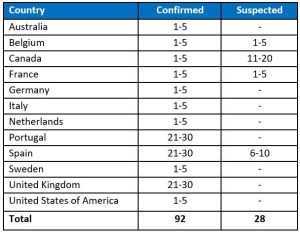
World Health Organisation table on Monkeypox spread as of 21 May at 13:00; it has since spread further around the world.
Israel became the first country to report monkeypox in the Middle East on Sunday 22 May.
The UAE became the first country in the Gulf to report a case of monkeypox on Tuesday 24 May.
Slovenia and the Czech Republic also reported their first cases on Tuesday, joining 18 other countries that have reported the virus outside its usual Africa base.
That number is expected to rise further still, but experts say the overall risk to the general population remains low.
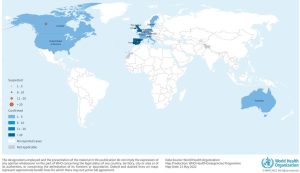
World Health Organisation map of monkeypox around the world as of 21 May 2022. Since this time monkeypox has emerged in the Middle East, including the UAE.
UAE Schools and nurseries warned to watch out for monkeypox
As Monkeypox cases rise around the world, schools and nurseries across the UAE have been issued a warning by health authorities to look out for signs of the viral illness in staff and pupils.
The probability of cases being imported to the UAE is high due to the load of international travel, states the Dubai Health Authority circular, which calls upon all health facilities operating in the UAE to immediately report any suspected, potential or confirmed cases through the electronic reporting system for contagious diseases, in order to prevent the spread of monkeypox and ensure the safety of the community.
What are UAE schools doing about monkeypox?
In this rapidly evolving situation, schools are presently following the guidance and communications from the UAE health authorities.
A spokesperson for GEMS Education told SchoolsCompared:
“As ever, we will closely follow all guidance from the DHA and will remain vigilant throughout the GEMS Education network of schools.”
The UAE’s health system is fully prepared to handle the spread of monkeypox and is proactively investigating and closely monitoring any cases, states MoHAP:
“We are currently studying and evaluating the seriousness of the disease locally, placing precise mechanisms for diagnosing suspected patients, and have issued a circular for all local medical cadres requesting them to report any suspected cases to competent authorities.”
“The technical advisory team for pandemic control has also prepared a comprehensive guide for surveillance, early detection of the disease, management of clinically infected patients and precautionary measures.”
“We are closely monitoring the spread of monkeypox worldwide and intensifying the local epidemiological surveillance in cooperation with other health entities to detect any possible cases and prevent the local spread of the virus.”
“We advise the public not to promote or be misled by rumours and to look only to official sources for information, urging everyone to follow up on the latest developments and guidelines issues by competent health authorities.”
What is Monkeypox?
Monkeypox is a rare disease that is caused by infection with monkeypox virus. Monkeypox virus belongs to the same genus (orthopoxvirus) as the variola virus (which causes smallpox), vaccinia virus (used in the smallpox vaccine), and cowpox virus. Although the clinical presentation of monkeypox resembles that of smallpox – which was declared eradicated worldwide in 1980 – monkeypox is thought to be less severe and less infectious than smallpox.
Monkeypox manifests as a “potentially serious viral illness that typically begins with a flu-like illness and swelling of the lymph nodes, and progresses to a widespread rash on the face and body,” according to the Center for Disease Control and Prevention (CDC).
Lymph-node swelling is a distinctive feature of monkeypox compared to other diseases that may initially appear similar (chickenpox, measles, smallpox).
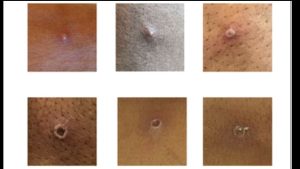
Monkeypox rash usually occurs a few days after initial symptoms of fever, malaise, headache, etc). Lesions progress through four stages—macular, papular, vesicular, to pustular—before scabbing over and resolving.
Dr Rania Ayat Hawayek, owner and Medical Director of Circle Care Clinic in Dubai, says:
“Monkeypox is a zoonotic virus (originates in animals) and is well known and documented, usually limited to some regions within the African continent. It causes an illness similar to chickenpox but of a higher severity.”
Why is it called Monkeypox? Is it a new disease?
Monkeypox is not a new disease but was first discovered in 1958 in scientific research monkeys, hence the name ‘monkeypox’. The first case of monkeypox in humans was found in 1970 in the Democratic Republic of the Congo (DRC). It is thought that African rodents and non-human primates (like monkeys) may harbour the virus and infect people – either through direct contact with an infected animal, or possibly through eating undercooked infected animals.
Since 1970, human cases of monkeypox have been reported in 11 African countries. The first outbreak in a country outside of Africa was in 2003 in the USA, which was linked to contact with infected prairie dogs, which had been housed with Gambian pouched rats imported from Ghana.
There have subsequently been several other cases of monkeypox in countries outside the Africa, all of which could be traced back to African travel.
However, in May 2022, multiple cases of monkeypox were identified in several non-endemic countries. Studies are in process currently to try to identify the epidemiology, sources of infection, and transmission patterns.
Is Monkeypox spreading more easily now?
Although Monkeypox is not a new disease, cases have previously been seen only among people with links to central and West Africa.
But this month countries in Europe, the US, Australia and now parts of the Middle East have all reported infections, mostly in people who had not travelled to Africa – which is unusual and thus cause for some concern.
The WHO states:
“The identification of confirmed and suspected cases of monkeypox with no direct travel links to an endemic area represents a highly unusual event.”
“Surveillance to date in non-endemic areas has been limited, but is now expanding. WHO expects that more cases in non-endemic areas will be reported. Available information suggests that human-to-human transmission is occurring among people in close physical contact with cases who are symptomatic.”
But it is too soon to worry at this point, says Dr Rania Ayat Hawayek of Circle Care Clinic in Dubai:
“We are living in an age where medical news reaches us in real-time, with very accurate and detailed information. This, I believe, is causing people to panic more than necessary.”
“At the moment, there is a very small number of cases globally, and the nature of this illness makes it easier to diagnose and contain.”
“We are more than equipped to recognise, diagnose, quarantine, contact-trace and treat any cases which may arise.”
View this post on Instagram
How dangerous is Monkeypox for children?
Monkeypox is usually a self-limited disease with the symptoms lasting from 2 to 4 weeks. However, as with many diseases, the World Health Organisation says that severe cases occur more commonly among children and are related to the extent of virus exposure, patient health status and nature of complications. Monkeypox during pregnancy may lead to complications, congenital monkeypox or stillbirth.
WHO’s fact sheet about Monkeypox states:
“Underlying immune deficiencies may lead to worse outcomes. Although vaccination against smallpox was protective in the past, today persons younger than 40 to 50 years of age (depending on the country) may be more susceptible to monkeypox due to cessation of smallpox vaccination campaigns globally after eradication of the disease.”
“Complications of monkeypox can include secondary infections, bronchopneumonia, sepsis, encephalitis, and infection of the cornea with ensuing loss of vision. The extent to which asymptomatic infection may occur is unknown.”
There are two clades of monkeypox virus, the West African clade and Congo Basin (Central African) clade. Although the West African clade of monkeypox virus infection sometimes leads to severe illness in some individuals, the disease is usually self-limiting. The case fatality ratio for the West African clade has been documented to be around 1%, whereas for the Congo Basin clade, it may be as high as 10%. As a point of comparison, the mortality rate of COVID-19 in the UAE is 0.3% according to John Hopkins University & Medicine figures.
Phylogenetic analysis of the virus currently circulating in 2022 suggests that it belongs to the less severe West African clade.
Do we have a vaccine against Monkeypox?
There is already a vaccine against Monkeypox named ‘Jynneos’, which uses a live, engineered version of the smallpox virus that does not infect the vaccinated person with the disease, but can still prompt an immune-system reaction to protect against both smallpox and monkeypox. Studies in Africa found that two doses of the Jynneos vaccine, given 28 days apart, were up to 85% effective in protecting people from getting monkeypox. It was approved by the U.S. Food and Drug Administration (FDA) in 2019 to protect against both smallpox and monkeypox.
Meanwhile Germany has reportedly ordered up to 40,000 doses of the Imvanex vaccine – used to treat smallpox, but also effective against monkeypox – to be ready in case the situation worsens.
Anyone vaccinated against the smallpox virus should still have some immunity against monkeypox – however, routine smallpox vaccination was ceased around 40 or 50 years ago (depending on the country) when the disease was declared eradicated, so anyone born after this will not have been immunised.
Although the clinical presentation of monkeypox looks similar to chickenpox, the chickenpox (varicella) vaccine – which we still administer as a matter of routine – does not protect against monkeypox.
However, immunizing people against monkeypox likely won’t involve a mass campaign as we saw during the pandemic, because monkeypox isn’t as contagious or as easily spread as SARS-CoV-2, the virus that causes Covid-19.
Is monkeypox going to be another pandemic?
It is highly unlikely that monkeypox is going to cause anything like the same sort of disruption as Covid-19, says Circle Care Clinic’s Dr Rania. Not only is it an established, previously studied disease with a vaccine already, but it manifests in a much more obvious way and so is easier to recognise and contain. Dr Rania says:
“It is not the same as Covid. I believe part of the concern people are experiencing is because ever since Covid we have a lot of information at our fingertips for anything that even remotely looks endemic, let alone pandemic.”
“Information comes through to us in a lot of detail and with a lot of accuracy and in real-time.”
There have been previous outbreaks of monkeypox around the world in the past few years, but they did not make such big headlines – possibly because there was less of an interest in and awareness about the possible impact of viruses from the general public in pre-pandemic times.
The level of contagiousness is very different to Covid-19, says Dr Rania:
“You usually contract it from direct contact with the lesions of the rash. This is different from the flu or Covid, which you can contract by just being in the same room as an infected person, who might not even be symptomatic.”
“In contrast, monkeypox makes a person very sick, and when the rash appears it’s very obvious there is something wrong enough for a person to isolate and for people to keep away.”
Countries such as Belgium have already introduced a 21-day quarantine period for direct contacts monkeypox patients, in order to allow for the potential three-week incubation period that the virus can take before it manifests.
Meanwhile France has announced it is starting a targeted vaccination campaign of at-risk adults who have been in contact with a patient with confirmed monkeypox
For the time being it is a matter of watching and waiting as the situation unfolds, but experts are keen to point out that there is no reason to panic, and the UAE health authorities have the matter in hand.
Although the emergence of this seemingly new and sinister-sounding disease might trigger more alarm bells than it would have done previously due to the fact we are all still recovering from the pandemic, this also means that countries are better prepared than ever before for tracking, tracing and isolating cases in order to limit spread. As Dr Rania says:
“Because of the nature of the illness our ability to contain it is great, especially in the UAE, what we have learnt from COVID has left us more than prepared for any illness that potentially could be endemic or pandemic.”
“For the time being, please don’t worry, stay safe, and hopefully this will pass like other outbreaks of monkeypox have passed previously. The only difference is that we didn’t hear about them as closely or in as much detail.”
Your Monkeypox fact file
Here is everything you need to know about monkeypox, according to the UAE’s Ministry of Health and Prevention (MoHAP):
INCUBATION PERIOD
The incubation period of the disease is 7-14 days and may extend to 21 days. The disease becomes contagious after the onset of a rash, usually three days after the appearance of a fever.
SYMPTOMS
Include the following:
Fever
Headache
Fatigue
Swollen lymph nodes
Muscle pain
A rash that starts on the face and spreads to the body
View this post on Instagram
HOW IT SPREADS
From animal to human:
Through contact with the blood, bodily fluids or skin lesions of an infected animal
From one person to another:
Through the airways of an infected person or contact with their contaminated personal belongings
TREATMENT AND VACCINATION
Most cases resolve spontaneously and symptoms usually cease within 2 to 4 weeks. An antiviral drug can be used in severe cases, for a limited period of time
The third generation of the smallpox vaccine, which is not widely available, can be used after exposure or infection to prevent the spread of the disease.
HOW TO PREVENT MONKEYPOX
- Avoid physical contact with infected individuals and do not share personal items such as towels and bed linen
- Wear gloves and the necessary personal protective equipment when caring for patients
- Wash hands regularly
- Cook all animal products well before consumption
- Wear gloves and protective clothing when approaching sick animals
- In light of international reports on recorded cases of transmission due to sexual activity, it is recommended to avoid unprotected sex
This is a rapidly developing story. We will update it as new information emerges.
© SchoolsCompared.com. 2022. All rights reserved.











































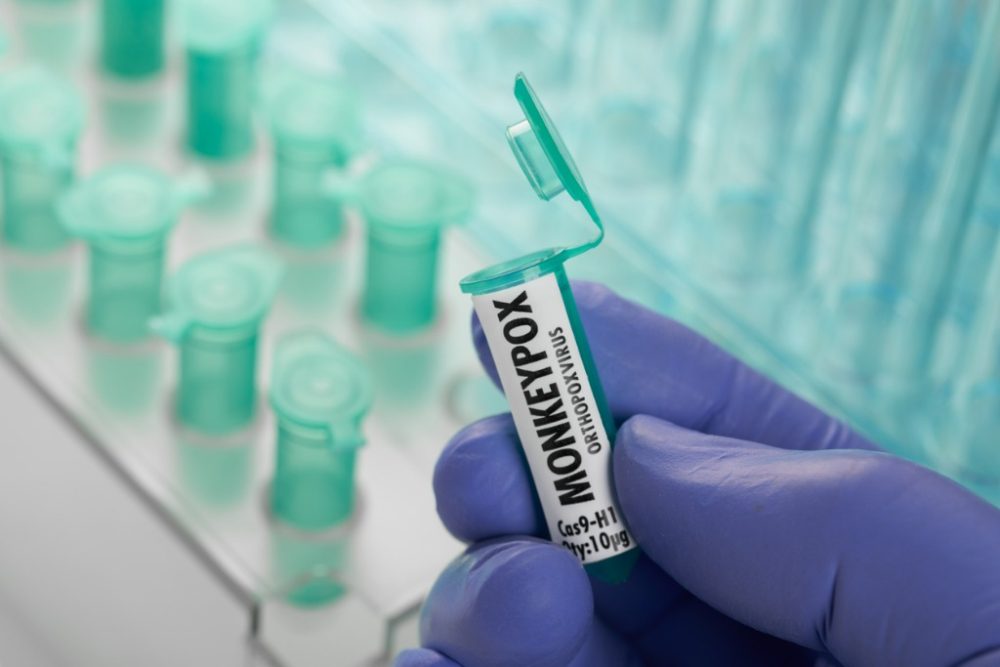

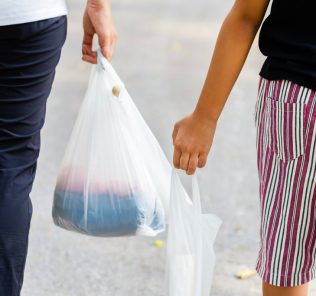
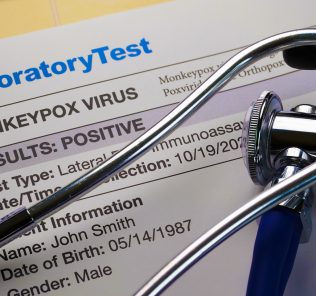
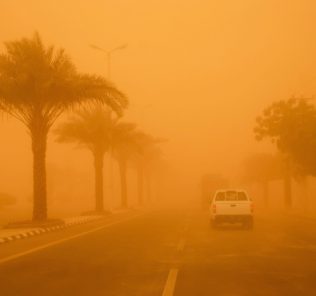
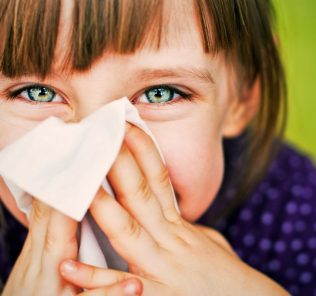














Leave a Response